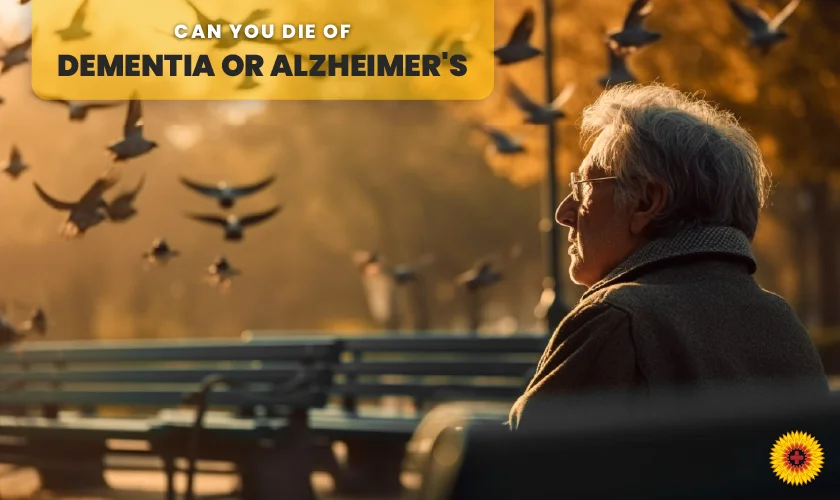How can you tell if you have dementia or Alzheimer’s? And can you die with it?
Often dementia and Alzheimer’s disease are used interchangeably, but they are not the same.
Let us give you a brief overview:
Dementia isn’t a particular disease – its symptoms fall under this umbrella term. There are also different types of dementia, and identifying symptoms can be difficult.
Some common causes of dementia include vascular dementia, Lewy body dementia, frontotemporal dementia (FTD), and others.
A person with dementia has symptoms that impair their memory, thinking skills, and social abilities severely enough to affect their daily lives.
However, Alzheimer’s disease is a type of brain disease.
It is characterized by symptoms of dementia that gradually get worse with time – dementia results from progressive damage to brain cells caused by Alzheimer’s disease.
It is the most common cause of dementia and is responsible for 60-80% of cases.
Below we will explore how you can recognize the signs of dementia or Alzheimer’s and whether they can be fatal.
Table of Contents
Recognizing the Signs of Dementia and Alzheimer’s
Dementia and Alzheimer’s affect people differently, causing different symptoms at different stages.
Some common signs to look out for in the early stages are:
- Loss of memory that disrupts daily life. Forgetting important dates, names, or events often.
- Issues with solving problems. Finding it hard to plan and organize once-easy tasks.
- Difficulty in thinking things through. The inability to think things through to the end.
- Disorientation with time or place. Losing track of dates, seasons, or the passage of time, or becoming confused in familiar surroundings.
- Poor judgment and reasoning skills. Thinking logically and making wise decisions become difficult.
- Changes in mood or personality. Experiencing unusual mood swings, depression, anxiety, or withdrawal from social activities.
- Having difficulty with language and communication. Struggling to find the right words or keeping up with conversations.
Get help from a healthcare professional if you or someone you love experience any of these symptoms – these can be the warning signs.
Seeking a Diagnosis
Getting help from a professional if you suspect dementia or Alzheimer’s is important.
You can be examined by your primary care physician and referred to a specialist, such as a neurologist or a geriatrician.
To rule out other possible causes of the symptoms, these tests might involve a medical history review, cognitive tests, imaging, and blood tests.
Diagnosing dementia or Alzheimer’s is a complicated process that might take some time.
Patience is important during this phase of life problem.
The Progression of Dementia and Alzheimer’s
Dementia and Alzheimer’s generally progress in stages.
The stages might differ in length and intensity among people, but they can be classified as mild, moderate, and severe.
Mild Stage: In the early stages, memory loss and cognitive decline become noticeable, yet people can still perform daily tasks independently with some difficulty.
Moderate Stage: Patients in the moderate stage have worsening memory loss and will likely require help with basic tasks such as dressing and bathing. Also, changes in behavior and confusion become more apparent.
Severe Stage: Patients lose their ability to communicate, become dependent on others for care, and experience delusions, hallucinations and severe physical difficulties – swallowing and walking become impossible.
Reaching care, support, and appropriate resources are essential to maintaining the quality of life for the person and their caregivers.
Treating Alzheimer’s Disease and Dementia
Currently, there is no cure for Alzheimer’s disease and dementia. There are several ways to manage symptoms and slow down the progression.
- Cholinesterase inhibitors (e.g., donepezil, rivastigmine) and memantine may be prescribed to manage cognitive symptoms in certain types of dementia and Alzheimer’s.
- Glutamine inhibitors help with learning and memory.
- Depression symptoms can be treated with antidepressants.
- Antipsychotic medications can be used to treat behavioral symptoms in some cases.
- Sleep medications can help changes in sleep.
- Certain types of dementia are treated differently depending on the underlying cause and might include discontinuing drug and alcohol use, treating B12 deficiency, treating hydrocephalus, and managing your blood sugar levels.
- Non-pharmacological therapies, such as cognitive stimulation therapy, occupational therapy, and reminiscence therapy, can help patients maintain cognitive abilities and function better in Alzheimer’s disease.
- Providing a supportive environment, involving caregivers in education and training programs, and accessing community resources and support groups can help.
Does Dementia Kill You?
Dementia and Alzheimer’s do not directly cause death but can cause complications that might eventually lead to death.
People with dementia can become more susceptible to infections, like pneumonia, which can be fatal.
As dementia progresses, people might also have difficulty swallowing, increasing their risk of aspiration pneumonia.
Malnutrition, dehydration, falls, and complications related to immobility can also contribute negatively to health.
Dementia’s specific impact on life expectancy varies depending on many factors, including the person’s general health, age, and the type and stage of dementia.
Excessive Sleep In Dementia
People with dementia or Alzheimer’s often have trouble sleeping.
During the day, some people may sleep excessively, while at night, they might experience restlessness or insomnia.
Changes in the brain and internal clock disruptions can cause sleep disruptions.
Final Thoughts
The early detection of dementia and Alzheimer’s disease is crucial to reaching care and support.
They can affect people and their loved ones in many different ways.
Understanding the symptoms and seeking medical attention early can help you get the necessary resources and treatment.
Although dementia has no cure, early detection allows for proactive management, helping people maintain their well-being.
Don’t forget; these are the days signifying the importance of cherishing each moment and seeking the care needed now.



No comment